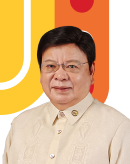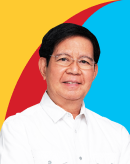What they’ve learned
Inquirer, on behalf of copresentor Nokia Philippines, gathered
together recently the five finalist teams in the My Dream Interview (MDI) contest for a meet-and-greet with the paper’s executives and editors, as well as the awarding of the Nokia Asha 200 mobile phones to the team members, including their teacher-coaches.
The teams recounted their experiences during their dream interviews with science educator Dr. Josette Biyo, prima ballerina Lisa Macuja-Elizalde, Senate President Juan Ponce Enrile, businessman Manny V. Pangilinan and Rappler executive editor Maria Ressa.
Three teams share here what they’ve learned from their summer encounter with their dream VIPs. The other two teams, Malayan High School of Science and Quezon National High School, will have their turn in forthcoming issues.
Special thanks to Maynilad for its sponsorship of the MDI workshops, to the University of the Philippines-Baguio and Cebu Daily News for making their facilities available as workshop sites, to the Inquirer Northern Luzon and Visayas bureaus, to the Inquirer editors who served as judges and to Cabalen for the merienda buffet.
Our stellar encounter with Planet Biyo
Team Paref Rosehill
The multiawarded science educator from Iloilo, Dr. Josette T. Biyo, granted us an interview for the Inquirer-WAN-Ifra My Dream Interview contest.
We learned so much from her—not only about best practices in teaching science but, more important, about values. Dr. Biyo is a woman of character and great faith. Her passion for excellence, love for work and commitment to service say it all.
Being in a room for two hours with someone great can change your perspective. When we left her office, I said to myself: “This is the kind of person I want to be.”
She showed me that my dreams and aspirations could come true if I really wanted them. Her father inspired and motivated her to do the best not only for herself and her family but also for society. Service is second nature to her. She has a great passion for teaching and I learned that learning is the best way to know how to teach.
Dr. Biyo helped me understand that life is not without difficulties. You could not reach the top of a mountain if you did not endure the exhausting climb.
Dr. Biyo taught me that crying did not show weakness because it required strength to cry. I learned that, while you could not always have the easy way out, God would always be by your side. Marie Louise B. Boncan
We chose Dr. Biyo because a planet was named after her. Also, she is an extraordinary teacher. Teachers like her have a big impact on our lives.
The most memorable lesson for me was when she said: “Life is not about being comfortable, it’s about making a difference.” She sacrificed so much to help the people in need. As a teenager, I see my peers wanting to have the newest gadget, to be the most fashionable or to know the latest gossip. I’ve realized I do not need those things.
I think having been able to interview her made me smarter, more observant and loyal to my country. Therese Marie Angangco
Our interview with Dr. Biyo was a once-in-a-lifetime experience and an opportunity to learn more about life and love.
First, you have to love your work so “it ceases to be work.” As she recounted her hardships, she said she did not give up because she knew that God would provide. This made me reflect: “Could I ever love God this much?” I found myself facing this life-changing question of faith.
Another lesson she shared with us was this quote from Mother Teresa: “We are not here to do big things, but we are here to do small things with great love.”
After the interview, I realized that this world was truly great. God was so kind to fill it with loving, passionate and wonderful people like Dr. Biyo. I resolved to do one big thing: Put love in all the things that I do.
I also learned much about teamwork. I learned how to share my ideas and, at the same time, be a good listener. Karen Racelis
As the girls would say, learning is a two-way street. I also learned from them during the process.
Dr. Biyo broke into tears as she recounted her difficulties and trials in life. That moment was very moving and was truly a learning experience for me.
Often, we have to make tough decisions about work and family, about ideals and dreams. It takes a lot of courage and character to leave behind a comfortable life to make a difference in the lives of thousands of young people.
And this is what I learned from Dr. Biyo. Her focus and drive, her passion for excellence, love for work, and spirit of service are marks of a truly great person. And she was humble enough to accept her limitations, always asking guidance from God in prayer.
After two hours with Dr. Biyo, I have become more convinced that working in a school, as a teacher or as an officer, is definitely fulfilling, although it may not be financially rewarding. When you become part of a child’s life, when you mold a young mind and forge his/her character, when you bring out the best in each student, you make a difference. This is a priceless reward. Glecy G. Gamboa, teacher
How we spent our summer with Lisa with an ‘s’
Team Fort Bonifacio High School
The long school break is always much awaited by students like us.
But our Red Cross Youth Club adviser, Irene Aquino, sent us to attend a workshop on interviewing. We wanted to acquire interviewing skills that we could use in the new school year when we recruit new members for our club.
When we heard about the My Dream Interview contest during the workshop, we decided to join to practice writing questions and to be able to spend time together.
Our first challenge was to agree on the interviewee. We were about to give up when Ms Aquino encouraged us to believe in our skills and told us that maybe God was giving us this chance.
We started to look into what we had in common and found out we were all into the arts—Bernadette was into theater, Sarah was good in drawing, Divine liked listening to music and Jude was fond of watching movies.
We researched about the arts and came across ballet. Further research led us to the prima ballerina of the Philippines, Lisa Macuja-Elizade.
When we learned we were among the five teams that would do actual interviews, we were apprehensive. We had not even experienced interviewing a local personality (like school or barangay officials). Our conversational English was not good. We did not have a video camera or a tape recorder. Luckily our team coach was able to provide the things we needed.
We did not expect to see Ms Macuja in casual clothes. We were all speechless. We did not know what to say. We were star-struck and tongue-tied!
She asked us what language we preferred. We were too rattled that we said English before we realized our command of the language was not so good. We corrected ourselves and said we preferred Taglish.
We felt so shy but she said, “OK, ’wag na kayong mahiya, magtanong lang kayo.” We were so relieved she said it in Filipino.
We interviewed her for more than an hour but it seemed like only five minutes because it felt like chatting with a close friend whom we had not seen for a very long time. She was very generous in answering our questions.
There were still many questions we wanted to ask but Ms Macuja had a tight schedule.
We felt so rewarded by that experience. It was the best summer we ever had, even though it was intimidating, rigorous and hectic. We learned a lot, we enjoyed ourselves, we gained confidence and we also won Nokia Asha phones.
We are proud of what we have achieved. We realize that out of millions of students our age we got what is a once-in-a-lifetime chance.
Sarah I. Cabuag
Divine Grace S. Ellana
Mary Bernadette M. dela Cruz
Jude Lorenz E. Francisco
Irene G. Aquino, teacher
A day with Lolo Johnny
Team Colegio de San Agustin
While most of my peers were planning trips to the beach for their summer vacation, I was busy preparing for a dream interview with Senate President Juan Ponce Enrile.
The day we spent with “Lolo Johnny” was definitely not what we expected, but it was a dream come true, one that we would never forget.
The Senate President’s office was quite big and intimidating. There in front of us was JPE himself. He started talking, but not in that serious tone we heard during the impeachment trial of the Supreme Court Chief Justice. He sounded like a wise grandfather.
As he answered our questions, I felt an overwhelming sense of calm—the kind you feel when your lolo sits on a rocking chair sharing with you memories of his past.
During the interview we realized that, while JPE was seen as a strict and rigid politician, he was still a human being who could feel. Three times during the interview, his memories brought him to tears.
Through his personal struggles, we realized no matter your status in life, you could succeed. With determination and hard work, you could be the “master of your fate,” as he quoted from the poem “Invictus.”
I expected we would finish the interview in 30 minutes, an hour at most. But we spent three hours with him, during which he told stories and jokes and shared his wisdom and ideals. They were three hours that completely changed how I saw things.
Now 88 years old, Enrile still has so much life and happiness in him. It takes little to make him happy. He is calm, level-headed and rational in spite of all the pressure he constantly faces. He lives to serve, and he finds joy in service. He is religious, loving, funny and truly wise.
When the interview finished, I realized that, if I lived to be his age, I would want to be just like him—dedicated, persevering and firm, someone who does not stop just because life goes wrong, someone who can make a difference and never forgets who he is even when he reaches the top.
It is not wrong to dream. That is what JPE did, and look where he is now. Jamie B. Gutierrez
“Mr. President…” that is how the people in the Senate address him, but we knew little about how “The Juan in Charge,” as one of the magazines put it, earned respect and his position.
Through the Inquirer’s My Dream Interview contest, I had the chance to meet and interview Manong Johnny, as the masses call him.
Inside his office you see the mace with the seal of the Senate, the Philippine flag, papers. What caught my attention was the portrait of his wife and daughter.
Manong Johnny gave us a huge smile and joked, “Just don’t ask me how many wives I have.”
Although he had to work to continue his studies and had to stop every now and then for financial reasons, Manong Johnny, was a good student, often finishing with honors.
While today’s youth will probably give up and give in to their problems, Manong Johnny is living proof we can still have a bright future no matter what or how hard the problem is as long as you have faith and the will to succeed. Riane Mitzi B. Manuel
As we entered the rather regal, blue-carpeted room, we were astonished by the sight of the man we usually just saw on television.
The serious, no-nonsense and stern man on screen was a kind, forgiving and happy soul in front of us.
As he talked, I realized the man who appeared as a strong man during the Edsa Revolution was now breaking down in front of me. His story truly moved my heart.
The rest of his story told me this man was toughened by the things he went through.
Manong Johnny told us how, while studying in Harvard, he was strongly tempted to go with the women he loved to their own countries. But he resisted the temptation, truly a Filipino, in and out of his country.
We asked him about his philosophy in life and he quoted a long line from the poem “Invictus.” He said, though we might think we were individuals, there was always a force that brought us together and that was God.
Juan was always a simple man with simple pleasures. He quoted the “Desiderata”: “With all its sham, drudgery, and broken dreams, it is still a beautiful world. Be cheerful. Strive to be happy.”
The Senate president taught me life was hard but we must learn from it, that life should be happy and we should strive to attain that. Joseph Rem de la Cruz
PhysicaL appearance can tell you something about a person.
But there is always something more than meets the eye.
This became really clear to me the day I met Senate President Juan Ponce Enrile.
For someone my age, I knew things about politics but did not have such a great interest in them. All I saw were powerful men and women, deciding great and important things for the nation. I could never imagine just sitting down around a table, having some snacks and chatting with them like they were my aunts or uncles or even grandparents. It would be unusual, knowing how busy and influential they are compared to me, just an average student. It would be impossible for that to happen.
Funnily enough, that was exactly how my encounter with JPE went. I expected that we’d be done with the interview in 30 minutes or an hour at most, but I was wrong. I had three hours with him, three hours of his stories, wisdom, jokes and ideals, three hours which changed how I saw things completely.
There was so much he told us, but some things stuck in my mind. He was born poor, an illegitimate child who was called a bastard by his classmates. But he was not ashamed to be poor.
“You have to suffer to know what it’s like to truly live,” he told us.
Suffering an injustice when he was in high school, he decided he was going to take up law to work for equality for all Filipinos. Katherine Anne M. Favino































